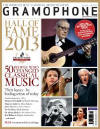Texte paru dans: / Appeared in:
*

GRAMOPHONE (06/2013)
Pour s'abonner /
Subscription information
DHM
DHM7901822

Code-barres / Barcode : 0886979018228
Consultez toutes les évaluations recensées pour ce cd
~~~~ Reach all the evaluations located for this CD

Reviewer: David Vickers
Mields and friends with arias, cantatas and concertos
Anyone
attracted to early-18th-century German Baroque music beyond Bach will admire
Telemann’s fertile melodiousness and exquisite craftsmanship but Dorothee
Mields’s recital reveals some fascinating obscurities that may not be familiar
to even fully paid-up aficionados of the startlingly prolific composer. The
impenetrable booklet essay fails to do justice to an intelligently planned
programme that flows ideally between contrasting musical moods, textures, keys
and genres, all played sensitively by L’Orfeo (expertly directed by violinist
Michi Gaigg). There are two secular cantatas that both rapturously anticipate
the arrival of a lover: Mein Vergnügen wird sich fügen is a delightful
miniature in which Mields’s gentle expression that ‘My delight will come and
perchance is already here’ is accompanied softly by solo flute and pizzicato
strings; the slightly longer multi-movement cantata Die Hoffnung des
Wiedersehens expresses similar sentiments in greater detail, and the first
aria, ‘Ssse Hoff¨nung, weim ich frage’, features gorgeous writing for two
bassoons in dialogue with Mields’s sweetly stylish singing. We also hear three
arias from the Singspiel Omphale (1724) and six arias written for
Telemann’s arrangements of operas by other composers for Hamburg’s Gänsemarkt
theatre, including two operas by Keiser and two by Handel; the poignant lament
‘Quillt, ihr überhhäuften Zähren’ is far more sophisticated than anything Handel
wrote for his juvenile first opera Almira (rearranged by Telemann in
1732). It is hard to think of a better specialist German Baroque soprano than
Mields at the moment; her flawless tone, awareness of instrumental interplay,
delivery of poetry and shapely phrasing provide nothing but undiluted pleasure.
Fermer la fenêtre/Close window
Cliquez l'un ou l'autre
bouton pour découvrir bien d'autres critiques de CD
Click either button for many other reviews


